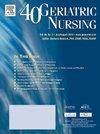残障长者照顾者二人组的复原力与心理困扰的关联与互动:行动者-伴侣相互依赖模型
IF 2.5
3区 医学
Q3 GERIATRICS & GERONTOLOGY
引用次数: 0
摘要
目的探讨残疾老年照顾者心理压力与心理弹性的关系及其相互作用。方法采用心理弹性量表、困扰量表和问题表对246名残疾老年人及其家庭照顾者进行调查。数据分析采用基于结构方程建模的行动者-伙伴相互依赖模型(APIM)方法。结果apim呈混合模型。残障老年人及其照顾者的复原力与其自身的心理困扰(关联-行为人效应)、二联体中其他成员的心理困扰(互动-伙伴效应)呈负相关。此外,行动者效应是伙伴效应的两倍。结论该混合模型提示,照顾者心理压力的增加和心理压力的减少可能与残疾老年人心理压力的减少有关。卫生专业人员应设计侧重于残疾老年人和照顾者之间的复原力和互动的二元干预措施,以改善他们的心理健康。患者或公众的贡献提高公众对残疾老年照顾者的弹性和心理困扰之间相互作用的认识。根据这些见解,倡导加强精神卫生资源和改进政策,以加强复原力,更有效地解决这一弱势群体的心理困扰。本文章由计算机程序翻译,如有差异,请以英文原文为准。
Association and interaction between resilience and psychological distress in disabled elderly–caregiver dyads: An actor-partner interdependence model
Objectives
This study examined the association and interaction between resilience and psychological distress in disabled elderly-caregiver dyads.
Methods
A total of 246 disabled elderly individuals and their family caregivers were studied using the Resilience Scale and the Distress Thermometer and Problem List. The data analysis employed the actor-partner interdependence model (APIM) method based on structural equation modelling.
Results
APIM revealed a mixed model. Resilience of disabled elderly individuals and caregivers is negatively associated with their psychological distress (association-actor effect), and the psychological distress of other member in the dyad (interaction-partner effect). Furthermore, the actor effect is twice as large as the partner effect.
Conclusion
This mixed model suggests that increased resilience and decreased psychological distress in caregivers may be associated with decreased psychological distress in disabled elderly individuals. Health professionals should design dyadic interventions focusing on resilience and interactions between disabled elderly individuals and caregivers to improve their mental health.
Patient or public contribution
Heighten public awareness of the interaction between resilience and psychological distress among disabled elderly-caregiver dyads. Based on these insights, advocate for enhanced mental health resources and improved policies to strengthen resilience and more effectively address psychological distress within this vulnerable community.
求助全文
通过发布文献求助,成功后即可免费获取论文全文。
去求助
来源期刊

Geriatric Nursing
医学-护理
CiteScore
3.80
自引率
7.40%
发文量
257
审稿时长
>12 weeks
期刊介绍:
Geriatric Nursing is a comprehensive source for clinical information and management advice relating to the care of older adults. The journal''s peer-reviewed articles report the latest developments in the management of acute and chronic disorders and provide practical advice on care of older adults across the long term continuum. Geriatric Nursing addresses current issues related to drugs, advance directives, staff development and management, legal issues, client and caregiver education, infection control, and other topics. The journal is written specifically for nurses and nurse practitioners who work with older adults in any care setting.
 求助内容:
求助内容: 应助结果提醒方式:
应助结果提醒方式:


